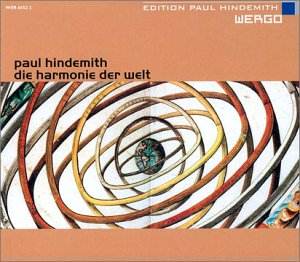This
last opera of Hindemith has not been available for 46 years, mostly
because of bad press at the time of its premier, and most especially
a scathing denunciation by Theodore H. Adorno. While I don’t know
Adorno’s attitudes toward children and dogs, a man who hated jazz
couldn’t have been all bad. Nevertheless, I suspect he currently
broils in a circle of Hell along with Eduard Hanslick and Claudia
Cassidy. It has taken three generations of musicologists to begin
to free us from the coils of this serpent. Adorno wrote on scant
knowledge of this work, imputed incorrect motives to the composer
and then and thus denounced the work essentially in ignorance
of it. Now, critics don’t actually hurt people, they just issue
orders, and other people carry them out, and these other people
must shoulder part of the blame, these people who can’t hear what
is before them. But you can’t hear what isn’t ever performed or
even on records, and this is the first recording of the work,
although the ‘Symphony’ or orchestral suite has been played in
concert for many years.
When
I want to get to know a new opera I put it to the most severe
test possible. After a quick scan of the scenario, I just put
it on the player, then get busy with something else and dare the
music to capture my attention. This music did, and I sat there
for three hours just listening, newly fascinated at each moment.
The surface of the music is beautiful, the structural integrity
of the music is fascinating, the dramatic tension is manifest,
climaxing brilliantly at the ends of the acts. The singers are
all virtually members of the orchestra, beginning, continuing,
and ending rhythmic and lyric phrases in participation with the
various instruments. This is a studio recording where the singers
can stand among the orchestra; it must be very difficult to perform
this opera on stage, for if a singer were to lose synchrony with
the orchestra for a fragment of a beat the music would fall to
pieces.
In
other words, this work is a real music drama. In Wagner’s works
of this genre, the orchestra still accompanies the singers and
in most places allows them considerable freedom of delivery. But
in this Hindemith work the singers are members of the orchestra
throughout and must sing exactly on time with it; it requires
considerable skill to achieve some expression while adhering to
such a strict rhythm, but these singers accomplish this admirably.
The
title is a German translation of the title of Johannes Kepler’s
book HARMONICES MUNDI (1619) and the
scenario consists of conversations among various individuals in
Kepler’s life and world and shows how they react to their surroundings
in contrast to the scientist’s personal search to express of the
harmony of the universe. It could be an allegory of any time,
from Galileo’s to Einstein’s, to Hindemith’s, but the drama here
is quite compelling on its own as Kepler is thwarted by selfish,
powerful lords thinking only of power and subjugation, while Kepler
must also struggle to save his spiritualist mother from condemnation
as a witch.
I
do not understand much German, so this lengthy rhetorical recitative
in what is for me an almost incomprehensible language overcame
a severe handicap in communication, something which can only be
explained by the tremendous skill and dedication of the performers
and the earnest conviction of the composer. Recently in Fanfare
magazine (USA) two reviewers eloquently stressed the ‘importance’
of this opera and this recording of it. I want to convince you
that it is beautiful, compelling, and enjoyable as well.
Now
that the Germans have revealed to us this hidden masterpiece,
I hope they will continue in this spirit to explore the vocal
music of C.P.E. Bach wherein I suspect reside many great beauties.
And while we are on the subject, let us have more opera by Vivaldi,
let us have a recording of George Whitefield Chadwick’s final
opera The Padrone from the USA, and last and most important
may the British at last bring an end to the shocking and inexcusable
neglect of Sir Donald Francis Tovey’s masterpiece The Bride
of Dionysos!
Paul
Shoemaker

![]() François Le Roux;
Arutyun Kochinian; Robert Wörle; Christian Elsner; Reinhard Hagen;
Sophia Larson; Michelle Breedt; Tatjana Korovina. (all sing multiple roles)
François Le Roux;
Arutyun Kochinian; Robert Wörle; Christian Elsner; Reinhard Hagen;
Sophia Larson; Michelle Breedt; Tatjana Korovina. (all sing multiple roles)
![]() WERGO WER 6642/3/4-2
3 CD [33.41 + 73.18 + 54.28]
WERGO WER 6642/3/4-2
3 CD [33.41 + 73.18 + 54.28]